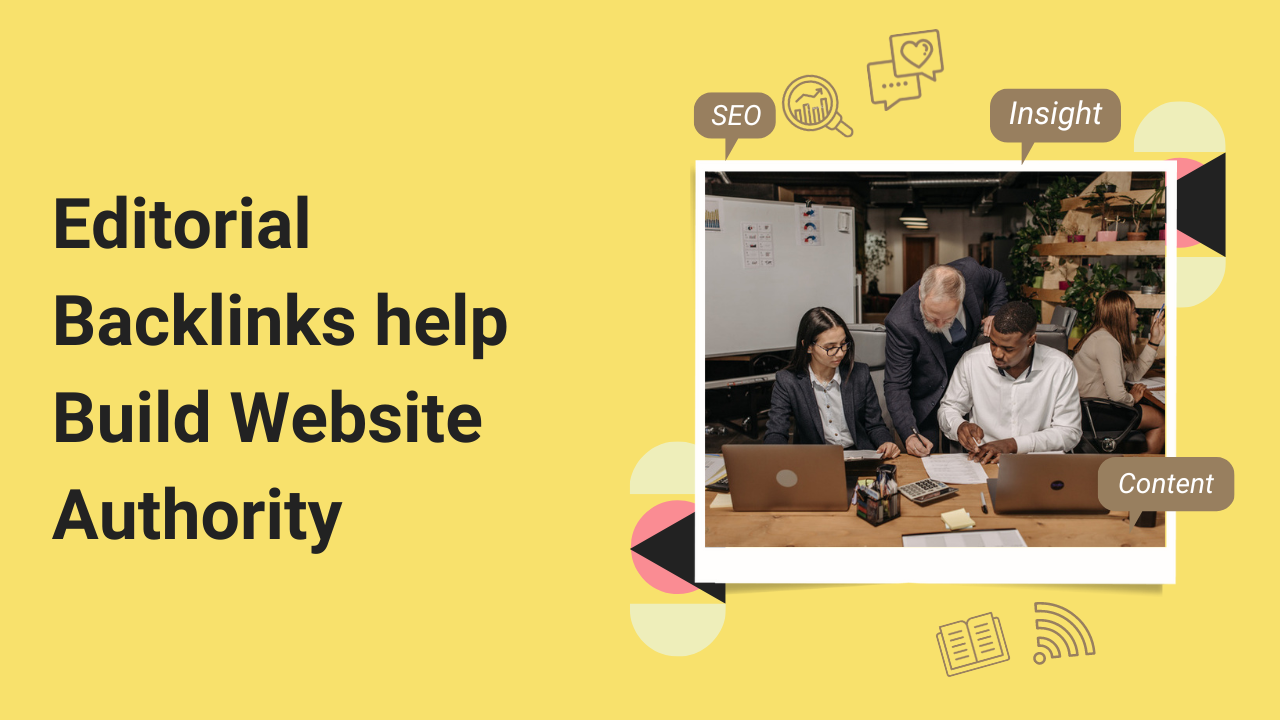
Table of Contents
Backlinks and search rankings have a strong correlation. Search engines will consider your website unworthy of ranking on the first page if it has few or no backlinks. That said, search engines value quality over quantity when determining a website’s rankings. Focus on building editorial links to reach Google’s and Bing’s first page of search results. Editorial Backlinks, in general, are more important to search engine optimization (SEO) than other types, because they have a larger impact on your website’s search results than other backlink types.
What is an Editorial Link?
A site with good content and marketing techniques is more likely to have an editorial link. Editorial links aren’t earned by paying for them or directly soliciting them like acquired links are. An effective link profile includes editorial links.
Below are a few benefits of Editorial Links.
1. Demonstrate your authority
Since an established source features and mentions the content, editorial links help establish you as an authority.
2. Search Engine Rankings
Editorial links offer SEO value, one of their main benefits. Having links from authoritative websites can help improve your search rankings. Your ranking in search engines improves when you get editorial links from authoritative sites as they provide your company with valuable links, help to build your link profile, and help to diversify your links.
3. Improved web traffic
In addition to gaining more traffic through the higher SEO rankings provided by editorial links, you also have a better chance of attracting a niche, more interested audience interested in learning more about your company. Your site will receive more traffic when you publish content that is both informative and unique.
4. Relationship-Building
It is essential that you contact other businesses when you are building editorial links. Getting in touch with other businesses has some other benefits besides getting a link. By developing long-term relationships, both businesses can benefit from the relationship in the future.
5. Establishing a brand
By building links that show your authority in your field, link building promotes your brand. This helps your company showcase its expertise and strengthens its products and services.
Do editorial links have any drawbacks?
However, editorial links have some drawbacks if you aren’t careful, and link building, in general, has some.
It is time-consuming to build links, especially editorial links.
A couple of inbound links isn’t going to make much of a difference and it will take time for that to happen. Usually, this process takes a few months to complete, and it’s not something that can be done overnight. It may be counterproductive to exchange reciprocal editorial links.
Creating links to other websites for reciprocal linking purposes, however, may lead to another website being more useful or interesting to someone. Misuse of this process can lead to penalties as well.
You can actually lower your ranking if you spend a lot of money on editorial links, but they are not quality links.
If you overdo it, you can lose your Google ranking. Linking out to non-relevant sites won’t provide the same benefits as linking out to relevant sites
Here’s how you can improve your editorial links
1. Involve the public relations department.
Public relations departments are responsible for contacting editor-in-chiefs and helping a company attain exposure. You may not be asked for a backlink, but you can ask about newsworthy content that might make it possible for the website to link to you. PR pros can sometimes reach out directly to editors if they have a relationship with them.
2. Leads can be obtained from your competitors.
Finding guest posting opportunities is the same. Consider your competition, and then try to target the same sites where they earn guest posts. You can use Google or Bing to see where your competitors are getting these links, then make sure you are as active on that site as you can (in the beginning, you might submit a few guest posts).
3. Provide a reference for another company.
You should let each company know if you mention them in an article (so they have an advertorial link). Share them on all your social media pages so they will share your content since they are mentioned you will have a greater possibility of them doing so. You’ll not only get on their radar sooner rather than later but also have a better chance of getting back to them.
4. Take part in interviews.
Interviews are some of the most shared content on the web, which means you’re sure to get a link or two from editors if you do one. Your blog’s content will be shared with that person’s blog if you interview them for their blog. Interviews with their own bloggers should be highlighted on the blog.
5. Learn more about the curators.
A content curator compiles a post of all the best content, usually on a specific topic, for a particular week or month. Your article counts as an editorial link if it is included as part of a curated post. Send the curator content that you believe could be a good fit and get to know him or her. At least you’ll be on the curator’s radar.
In the long run, you will find that earning editorial links is easier than it was at the beginning. It’s also vital that editorial links provide readers with clear, useful information. PR professionals shouldn’t be expected to request links when they don’t make sense, and not include links when they aren’t useful to the reader.
Your website can be promoted in dozens of ways, both free and paid. Syndicating content, blogging, and email marketing are all free methods of promoting websites. In contrast, paid promotional techniques can be obtained using Google AdWords, Bing AdWords, Facebook Ads, Instagram Ads, Twitter Ads, Criteo Advertising, and AdRoll.
Although your website’s search ranking can be improved with other types of backlinks, you shouldn’t discount the importance of editorial links. They hold more meaning in metaphorical SEO terms since they are organically placed on authority websites. The reciprocal links are also important.
About the Author
My name’s Semil Shah, and I pride myself on being the last digital marketer that you’ll ever need. Having worked internationally across agile and disruptive teams from San Fransico to London, I can help you take what you are doing in digital to a whole next level.



